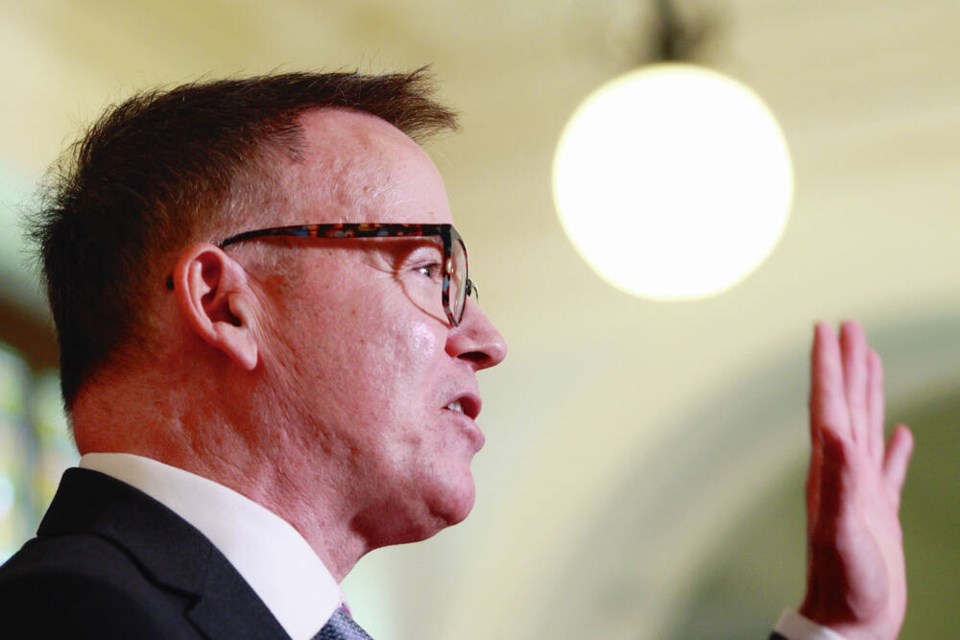B.C. United wants your vote. Never heard of them? You’re not alone.
That’s the name being floated by the B.C. Liberals as part of leader Kevin Falcon’s quest to rebrand and revitalize the party.
“B.C. United is a fresh alternative that expresses the party’s long-standing commitment to unity across a broad coalition of party members, as well as highlighting British Columbia front and centre in the name choice,” the party said in a statement Tuesday.
The rebranding was a key plank of Falcon’s leadership campaign and comes on the heels of the B.C. Liberals’ poor showing in the 2020 election, which resulted in its lowest seat count in three decades. The former B.C. Liberal cabinet minister became leader in February and won a seat in the Vancouver-Quilchena riding during the April 30 byelection.
Falcon wants to rebrand the party to remove any perception of ties to Prime Minister Justin Trudeau’s federal Liberals and reflect the party’s status as a big-tent coalition of federal Liberals and Conservatives.
During the party’s convention in June, two-thirds of Liberal delegates agreed to proceed with the name-change process.
The party said ore than 2,000 suggestions were submitted over a three-month period through an online portal, suggestion boxes, text messages, QR codes and feedback during Falcon’s summer tour of the province.
Now that the potential new name has been revealed, all 45,000 party members will be asked by the end of the year to vote on whether to rebrand or stick with the status quo.
The B.C. Liberals have registered B.C. United with Elections B.C. as an alternate name for the party.
“I’ll personally be voting in favour of changing the party name, and I’m hopeful our members do, too,” Falcon said in a statement.
However some in the party are only willing to vote for a rebranding if it happens after the next general election — which is set for October 2024 but could be called earlier — to avoid confusing the electorate.
B.C. Liberal vice-president Caroline Elliott said the party will be strategic about the timing of a name change.
“We are going to be smart about this, and that’s been the commitment from the beginning,” Elliott said in a statement. “The NDP have broken the fixed election law before — calling a selfish snap election at the height of the COVID pandemic — and they won’t hesitate to do it again. If the vote passes, the name will be changed, but there will be flexibility to ensure the NDP don’t take advantage of the situation for their own political gain.”
Brand confusion could help the B.C. Conservatives, which secured 12 per cent of the vote in the Surrey South byelection earlier this month.
Falcon said in June he has no plans to court the B.C. Conservatives to form a coalition like Jason Kenney’s United Conservative Party, which merged Alberta’s Wildrose and Progressive Conservative parties.
The B.C. Liberals have flirted with changing their name several times before, including in 1996 and 2013, but the idea didn’t get enough support from party faithful, who worried about diluting the brand.
Stewart Prest, a political scientist at Squamish-based Quest University Canada, said the name change is one part of a larger renewal process for the B.C. Liberals as they work to recapture votes lost in the 2020 election, which resulted in their lowest seat count in three decades.
The fact that the new name doesn’t include Liberal or Conservative is a “clear attempt to signal they’re trying to bridge the divide between those two, sometimes very different, political camps,” Prest said.
On social media, the new name sparked jokes about B.C.’s newest soccer team, since “united” is a common moniker used by some Premier League teams.
“I assume [the B.C. Liberals] saw that coming and perhaps they thought politics is very much like a team sport anyway, so they’d be able to lean into the metaphor a little bit,” Prest said.



